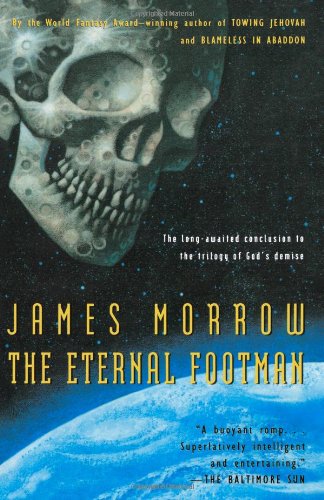
God’s body has self-destructed and His skull is now in orbit directly above Times Square, triggering a plague of “death awareness” and causing the United States to resemble fourteenth-century Europe during the Black Death.
As the epidemic accelerates, two people fight to preserve life and sanity: Nora Burkhart, a schoolteacher who will stop at nothing to rescue her only son, and Gerard Korty, a brilliant sculptor struggling to to create a masterwork that will heal the metaphysical wounds caused by God’s abdication. Among other apocalyptic wonders, Morrow depicts a pitched battle between Jews and anti-Semites on a New Jersey golf course … a theater troupe’s stirring dramatization of the Gilgamesh epic … and the villainy of Dr. Adrian Lucido, founder of a new church in Coatzacoalcos and inventor of a cure more dreadful than any disease.
* * *
|
THE STORY IN BRIEF
The symptoms of Abulic Plague — the deadly epidemic that results when God’s gigantic skull begins looming over Western civilization — are both physical and metaphysical. Each victim is haunted by his own private “fetch,” a satanic doppelgänger bent on dragging him to his grave. When schoolteacher Nora Burkhart realizes that her young son has contracted the disease, her grief is soon supplanted by her hope of finding an effective treatment. Nora is determined to battle Kevin’s fetch to the end. |
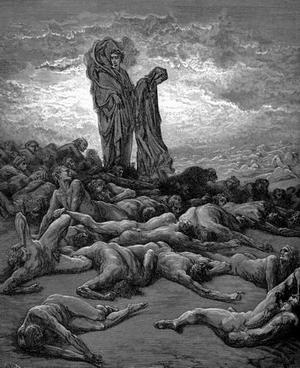 |
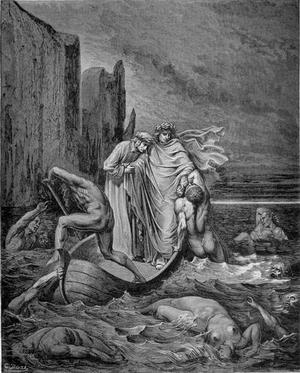 |
Our heroine’s odyssey takes her and Kevin southward through an America utterly transformed by the pestilence. Nora survives the Battle of Paramus, runs afoul of flagellants, and falls in love with an actor who perversely presents a production ofGilgamesh the King to humanity’s remaining remnants. Reaching New Orleans, Nora convinces ship captain Anthony Van Horne to pilot her across the Gulf of Mexico to Coatzacoalcos, where the mysterious Dr. Adrian Lucido has reportedly developed a cure for the Plague. |
| In Coatzacoalcos Nora manages to get Kevin into the Lucido Clinic. While therapists treat the ailing child, Nora befriends a sculptor named Gerard Korty, whose studio lies far up the Uspanapa River. Korty is completing his magnum opus: a huge sculpture of the human brain wrought from a chunk of the asteroid that caused the great Cretaceous dying — “the dinosaurs’ tombstone,” as he puts it. If Korty is correct, his masterwork will help humanity renew itself once the Plague passes. |
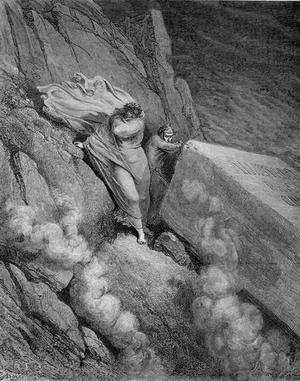 |
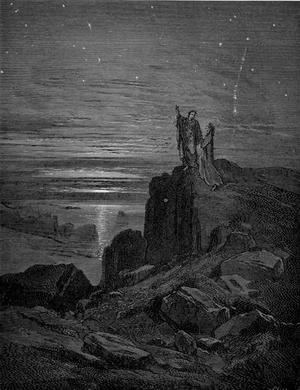 |
To her horror Nora learns that the cures effected by the Lucido Clinic are not necessarily permanent. But her true destiny, it develops, extends beyond the salvation of a single child. One night Nora’s own fetch leads her through the jungle to the summit of a Maya pyramid. With the aid of hallucinogenic drugs, Nora experiences visions of the viable and humane civilization that may conceivably emerge in the wake of the Plague. But first Nora must become the paladin of Korty’s numinous sculpture, a commitment that could lead to her death. |
|
Illustrations from Dante’s Divine Comedy by Gustave Dore.
|
“There’s a bit of the later Mark Twain here, a hint of Dante, a dab of T.S. Eliot. and a lot of knowledge and sympathy for the human condition. It’s all in a package that will rock you back in your chair and make you take notice on almost every page.”
Jim Hopper
The San Diego Union
“The death of God and resulting apocalyptic events narrated here provide food for philosophic and theologic speculation. But its wicked comic riffs on modern faith and faithlessness make the book crackle and burn … (Nora Burkhart’s) journey takes her through a surreal post-apocalyptic American landscape whose vision of catastrophic survival is, all at once, uproarious, scary, unthinkable, and weirdly plausible.”
Laura Demanski
The Baltimore Sun
“Any novel that springs from a sparkling intellect rather than a dreary neurosis is cause for celebration, and The Eternal Footman, with its load of truth and laughter, justifies a considerable quantity of champagne.”
Tom Robbins
author of Even Cowgirls Get the Blues
<p”>”Morrow finds a positive vision for his unhinged world as he brilliantly wraps up one of the wildest series ever written.”
Fred Cleaver
The Denver Post
“What holds the book together … is Morrow’s powerful evocation of emotional extremity, especially the alarm and tenderness felt by a parent for an ailing child.”
Gregory Feeley
The Philadelphia Inquirer
“In all, another gorgeous Morrovian performance, another paen to the ductility and power of both satire and speculative fiction in the hands of a virtuoso at the top of his game.”
Michael Bishop
The New York Review of Science Fiction
“Morrow’s insanely ingenious plot, reminiscent, variously, of B-science fiction movies in the 1950’s, Evelyn Waugh’s The Loved One, and Terry Southern at his most charmingly deranged, brings together several characters unwilling to accept evidence of their planet’s (and their own) mortality…”
Kirkus Reviews
“Morrow understands theology like a theologian and psychology like a psychologist, but he writes like an angel. The Eternal Footman takes the reader on a journey through an undiscovered country where everything is at once utterly strange and wrenchingly familiar.”
Richard Elliott Friedman
author of The Hidden Book in the Bible
“The trilogy concluded with The Eternal Footman is one of the finest and most timely literary products of its day.”
Brian Stableford
Paradoxa
“Morrow leaves aside cutting satire to achieve something more, at once eloquent, intellectual, tragicomic, and surprisingly optimistic.The Eternal Footman may be a deliberately quirky, untidy book, but there’s real greatness here, its virtues unencumbered by a quest for the ideal.”
Faren Miller
Locus
FAITH JUSTICE INTERVIEWS JAMES MORROW ON “THE ETERNAL FOOTMAN”
This exchange is excerpted from a conversation that occurred between Faith Justice and James Morrow on iUniverse.com.
FJ: I’ve always admired your quirky complicated characters — people just on the edge of mainstream, neighbors with a twist. You did it again in The Eternal Footman with Nora Burkhart, the ex-English teacher and flower-delivery person, and Gerard Korty, the reclusive “modern Michelangelo.” Where did they come from?
JM: A common criticism of SF is that it settles for far too simplistic an understanding of the human psyche. In the words of Thomas Disch, the genre lacks “a decent sense of despair.” It’s a fair complaint, I feel. There’s certainly no evidence that, as our species becomes increasingly dependent on technology and our world becomes increasingly science-fictional, we’re losing our psychological complexity. Indeed, most people would argue that inner turmoil and ineffable existential dread have increased in the post-industrial age.
Nobody in a feudal fantasy like The Lord of the Rings or Dune experiences anxiety attacks of unknown origin. Nobody has to cope with migraines or hemorrhoids or suicidal depression. Maybe they shouldn’t. Maybe that kind of realism would destroy the very conventions that permit such novels to delight us. But I do worry when an author places a caste system at the center of a novel and then fails to ask searching questions about it. To make any sense of the Dune books, you have assume that the average Sardaukar storm-trooper or Bene Gesserit witch has nothing that we would call an inner life. That’s not a leap I enjoy making.
Having said all this, let me hasten to confess that I’ve always found characterization to be the hardest aspect of novel-writing. I conceive of my stories in terms of themes and situations first, human psychology second. If I were completely honest, I’d have to admit that the main reason I give my characters vivid occupations — Murray Katz processing snapshots, George Paxton carving tombstones, Nora Burkhart delivering flowers, Gerard Korty sculpting the Divine Comedy — is that it simplifies the characterization problem. This strategy affords me lots of “objective correlatives” for my character’s mental states, including their self-doubts and neuroses. That’s better than the stupid conceit of a worry-free Sardaukar, but it’s certainly not the highest variety of psychological fiction. I’m not Dostoyevsky.
FJ: You’ve described Towing Jehovah as a fantastical Lord Jimand Blameless in Abaddon as a retelling of the Book of Job. What are the literary roots of The Eternal Footman?
JM: Its primary touchstone is The Epic of Gilgamesh. I’m not very subtle about this ancestry. My heroine spends part of the novel traveling with a theatre company that’s producing a more-or-less faithful adaptation of Gilgamesh in a succession of southern towns.
We hear a lot these days, especially from academic precincts, about the deterministic nature of human language and culture. There is no such thing as a universal human spirit, the postmodern intellectuals argue. All realities — moral, epistemological, psychological — are ultimately “local,” conditioned by immediate social and linguistic norms. Even science, the postmoderns say, can be profitable scrutinized through this radically relativistic lens.
And yet here’s Gilgamesh, the world’s oldest surviving epic, speaking to us with poignancy and immediacy about the bedrock tragedy of the human condition. The theme is the inescapability of death, and the poem tells us how utterly human it is to wish that things were otherwise. If Gilgamesh is essentially “local,” then I say the hell with it.
The Eternal Footman also owes a debt to Camus’s The Plague and to Peter Barnes’s marvelous play about the Black Death, Red Noses. As I’ve commented elsewhere, it’s possible to map the whole Godhead Trilogy onto the Divine Comedy. Towing Jehovahcorresponds to the Purgatorio — the characters are trapped in a gray domain defined by their moral limitations. Blameless in Abaddon is the Inferno in a different key. (“Abaddon” is a Hebrew word that can be translated as “hell.”) And Footman, with its glimpses of a post-theistic utopia, might be regarded as a kind ofParadiso. But this is all rather cerebral. Let’s drop it and go on to the next question.
FJ: You’ve lamented that, unlike nineteenth-century writers, modern novels deal primarily with “quotidian life and its discontents.” What are the grand questions you wrestle with in this trilogy, and did you come up with any answers?
JM: No, let’s not go on to the next question. Aaarggh! I’m overwhelmed! This is a great question, but I could spend the rest of the week trying to answer it!
Let me attempt an end run around the problem. Let me talk briefly about the gap between the cosmic riddles I thought I’d be confronting in the Godhead Trilogy and the riddles I really didconfront.
Before I actually wrote Towing Jehovah, I’d assumed it would be a satire on the common notion that, when a society loses faith in God, it ceases to be moral. But eventually I took the theme much more seriously, and I ended up giving theism its due. Once the crew of the Carpco Valparaiso discovers that nobody is peering down from Heaven, they lose their moral compass: murders and orgies start becoming the norm.
But only temporarily. By the end of act two, the Kantian categorical imperative has taken hold, and the crew starts behaving decently again. So a novel that began life as a kind of science-fictional joke — what if God died? — ended up addressing other sorts of questions. How do we account for ethical behavior? What might a non-theistic morality look like? Do we behave decently merely because we fear divine retribution, or are we a better species than that?
I went into Blameless in Abaddon knowing that the plot would revolve around God’s long overdue trial for crimes against humanity. But until I began investigating theodicy in depth, I had no idea that the case for the defense could be so rich and complex. Christian theologians have been explaining God’s ostensible complicity in human suffering for nearly 2,000 years, and they’ve accomplished a lot — so much, in fact, that I decided to have the World Court judges return a “not guilty” verdict. And here I thought a single case of childhood cancer would make the prosecution’s case!
But there’s a problem, of course. Because after you’ve hammered together your beautiful little theodicy — whether you’re Saint Augustine or C. S. Lewis — you’re still stuck with that suffering child. So while the World Court was ultimately willing to let God off the hook, you can be sure that James Morrow was not.
On the drawing board, The Eternal Footman was supposed to address the following theme: “No matter what the clerics tell us, death means nothing but oblivion, and it’s also the primary source from which the world’s religions draw their energy.” But during the composition process, I realized that death is a more ambiguous phenomenon than my original notes allowed. I still have no use for it in my personal life, but I can see how — from the broadest evolutionary and historical perspective — the case for death’s necessity is probably even better than the case for God’s goodness.
As for the notion that death-denial lies at the heart of most religions, I have one of the characters in Footman say this very explicitly. But I’m no longer prepared to reduce religion to that formula. LikeTowing Jehovah, The Eternal Footman got me speculating about the genesis of ethical behavior, and I concluded that religiously-rooted narratives like the Good Samaritan certainly have their part to play.
FJ: In The Eternal Footman you propose two alternative utopias: Deus Absconditus and Holistica. Which one would you want to live in and why?
JM: The great challenge I faced in writing The Eternal Footman was to move beyond my usual anti-religious satire and offer a few glimpses of a world that has somehow evolved beyond God. This is Deus Absconditus. It’s not Utopia, but it is a “land of the grown-ups.”
Readers who examine my hostility to organized churches closely will notice the gravamen of my indictment centers on the idea that religion infantilizes us. In the West, this infantilization process is displayed in much of our religious rhetoric. God is a “father.” Jesus wants us to approach him as “children.” Many Christians fancy themselves “born again.” (Let’s remember, to be “born” means to enter a state of infancy, not a state of enlightenment.)
Anybody familiar with my oeuvre knows that I think children are absolutely marvelous beings. But they are not adults. They aren’t obligated to shoulder the same moral responsibilities as grown-ups. When Jerry Falwell or Billy Graham tells you how the world works, listen very closely. You will hear a child talking.
Holistica is presented as a kind of New Age alternative to Deus Absconditus, and I think it’s essentially a nightmare. At its worst, the New Age mentality is no better than the organized-church mentality. It doesn’t just invite us to be children. It invites us to abandon rationality altogether. It asks us to be chipmunks.
FJ: In The Eternal Footman, one of your protagonists, Nora Burkhart, suffers a terrible punishment for “loving her child too much.” Earlier in the story she makes a choice which she thinks will save her son, but knows it means the death of many others. Since God is dead, who punishes her?
JM: Nora’s situation constitutes the most tragic and ambiguous trap I’ve ever set for a protagonist. She’s not fundamentally a victim: indeed, she’s the savior of civilization. But she’s still trapped.
When one of my death avatars, Quincy the fetch, tells Nora that she loved her child too much, he’s not necessarily speaking the truth. A few pages later, Nora’s rescuer tells her, “Death is a lousy philosopher.” But I wanted to raise the bedeviling and maddening idea that, in our determination to do right by our loved ones, we may do other people harm.
I won’t give away the emotional climax of Footman — I won’t say exactly how Nora is punished — but her downfall presumably traces to what, throughout the novel, I call God’s “death throes.” Yes, the Supreme Being is “dead,” but his dark side still sends out reverberations, most conspicuously the fetches. Only after the last fetch vanishes do we truly enter the “post-theistic age.”
FJ: You call yourself a “scientific humanist.” What does that mean?
JM: I like that term — I first heard it in connection with Jacob Bronowski — because there’s something slightly paradoxical and ambiguous about it. And I think that worthy fiction always partakes of paradox and ambiguity.
C.P. Snow’s famous dichotomy between “the two cultures,” scientists versus humanists, goes back to 1962, and I think it’s still very much with us. If anything, the schism has gotten worse in recent years. Snow was concerned about the failure of academic humanists to comprehend the insights of science. Today we have hundreds of postmodern academics who are actually proud of their failure to comprehend the insights of science — a pride in which they are so noisy and articulate and persuasive that they make someone like myself feel slightly ashamed to be caught using a phrase like “the insights of science.”
The astonishing hoax that Alan Sokal perpetrated six years ago in the pages of Social Text — feeding the postmodernists’ catechism back to them in a form so flattering that they didn’t recognize it as a parody — points up the essential bankruptcy of the contemporary “science studies” movement. When Swift published “A Modest Proposal,” most educated people understood that he was being satiric. Unfortunately, the same cannot be said for Sokal’s “Transgressing the Boundaries” and the faculty of Duke University, the wellspring of Social Text.
Bronowski liked to point out that science is “a very human activity.” I think he meant that it’s a mistake to regard science as a sterile, passionless, bureaucratic pursuit, destined to turn us into numbers. But the postmoderns have distorted Bronowski’s idea — as they have distorted similar ideas drawn from Thomas Kuhn and Karl Popper — beyond recognition, casting science as a mere “metaphor” or “narrative.” Bronowski was inviting humanists to join in the great post-Enlightenment conversation about the limitations and misuses of scientific knowledge. And the humanists, to their eternal shame, responded by declaring that the Enlightenment was dead.
The success of the Sokal hoax makes me especially sad because we do need a serious critique of science in this culture. The apologists for the technocratic machine must be countered and contradicted. But this will never happen by filtering science through the bizarre epistemologies of French intellectuals. Jacques Derrida didn’t discover the threat to the ozone layer. Scientists did. (Their names, for the record, were F. Sherwood Rowland and Mario Molina of the University of California.)
FJ: Your writing has been called everything from “irreverent” to “blasphemous.” How would you characterize your writing and, given Salman Rushdie’s fate, does this vehemence affect your writing or personal behavior?
JM: Obviously a whole book could be written about the Rushdie affair and the differences between Western and Islamic perceptions of fiction and its power over reality. (In fact, whole books have been written about these matters.) On most days I don’t imagine myself becoming the next Rushdie — I don’t fear reprisals from Christian militants. At this point in history, theological satire in the West flies well below the radar of the religious right. There’s no need for me to put a barbed-wire fence around my house.
Believe it or not, I sometimes wonder if my relentless railing against Christianity doesn’t go too far. At a certain point, obviously, any sort of blasphemy can become hurtful, irrelevant, or puerile. But I keep coming back to this question: who struck first, the satirist or the sacristan? And the answer is clearly, the latter.
We must be angry about Christianity’s historical complicity in war, slavery, anti-Semitism, and the subjugation of women. God knows, that’s not all we should be angry about. Secular belief systems also have much to answer for — maybe they even have more to answer for. I don’t know. But it’s my particular job to keep shouting, “Look where the theistic-salvationist worldview leads us if we’re not careful!”






